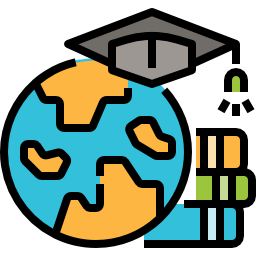Why study in the United States?
Studying in the United States can offer a range of advantages and opportunities for international students. Here are some reasons why studying in the United States can be beneficial:
Academic Excellence and Variety of Options:
- The United States is home to some of the best universities and educational institutions globally. Academic programs are often recognized for their quality and excellence in various fields of study. Additionally, the country offers a wide range of study programs, from undergraduate degrees to graduate programs and specializations. Students can choose from a diverse array of disciplines and academic approaches.
Innovation and Technology:
- The United States leads in research and development across various fields internationally, providing students with the opportunity to access cutting-edge technologies and approaches in their field of study.
Multicultural Experience:
- Studying in the United States allows students to interact with people from diverse cultures and nationalities. This multicultural experience enriches learning and promotes intercultural understanding.
Job Opportunities and Personal Development:
- Obtaining an education in the United States can enhance future job opportunities. Companies and employers value the academic training and international experience of graduates. Studying in a foreign country like the United States fosters independence, adaptability, and self-confidence. Students have the opportunity to grow personally while facing new challenges.
Academic Resources:
- Universities in the United States offer a wide range of academic resources, such as libraries, laboratories, and research opportunities with state-of-the-art technology for students from around the world.
Dynamic Student Life:
- Student life in the United States is lively and diverse. University campuses often provide a wealth of activities, clubs, and events that enrich the student experience.
Improvement of English Language:
- Studying in an environment where English is the primary language helps improve communication skills in this language, which can be beneficial in the international workplace.
It's important to note that studying in the United States may require proper planning and preparation in terms of visas, costs, and admission requirements. However, for many students, the educational and cultural experience in the United States is highly enriching and can make a difference in their personal and professional development.
What can you study in the United States?
As a foreigner, you can study a wide variety of programs and careers in the United States. Universities in the United States offer a great diversity of academic options for international students. Some popular areas of study in the United States include:
- Business Administration
- Engineering
- Computer Science
- Social Sciences
- Biological Sciences
- Economics
- Arts and Design
- Health Sciences
- Communication and Journalism
- Education
- Environmental Sciences
- Architecture and Urban Planning
- Mathematics and Statistics
- Law
- Political Science
- International Relations
- Psychology
- Life Sciences
- International Studies
- Information Technology
It's important to note that these are just a few of the careers available to study in the United States. It's crucial to research and compare educational institutions, review admission requirements and costs, and consider scholarship programs and financial aid available for international students. Additionally, make sure to comply with student visa requirements to legally study in the United States.
What do you need to study in the United States?
When studying in the United States as a foreign student, there are several requirements that must be met. Here's a summary of the most important ones:
Admission to an Educational Institution and Obtaining a Student Visa:
- First, you must be accepted into a university, college, or academic program in the United States. You need to submit an admission application and meet the academic and language requirements set by the institution. According to the student visa, once you have been accepted into an educational institution, you'll need to obtain a student visa (usually the F-1 visa) to enter the United States for study purposes. You must submit Form DS-160 and meet the requirements of the U.S. Embassy or Consulate in your country.
Demonstrate Financial Solvency:
- You will likely need to demonstrate that you have enough financial resources to cover the costs of studying and living in the United States, including tuition, accommodation, food, health insurance, and personal expenses.
Language Proficiency Test:
- Many institutions require international students to demonstrate their English language proficiency through tests or certifications such as TOEFL or IELTS. These exams assess your ability to communicate effectively in English.
Obtain Health Insurance:
- It is common for institutions to require international students to have valid health insurance during their stay in the United States.
Meet Academic Requirements and Maintain Student Status:
- Once in the United States, you must meet the academic requirements of your study program and maintain legal student status to keep your visa valid.
Each institution may have specific requirements and deadlines, so it is recommended to communicate directly with the university or college you wish to apply to for detailed information about the necessary steps and documents.
Emigrating to the United States for study can be a challenging process, but with proper planning and compliance with requirements, it can be an educationally and culturally enriching experience.
Why work in the United States?
Working in the United States as a foreigner can offer numerous opportunities and benefits, making it an attractive option for many people. Here are several reasons why it is a great choice for employment:
Job Opportunities and Competitive Salaries:
- The United States is one of the world's leading economies and provides a wide range of job opportunities in various sectors, opening doors for professional and personal growth. Generally, salaries in the United States are competitive and appealing to many foreign workers, allowing for a comfortable standard of living and an improved quality of life.
Diversity and Multiculturalism:
- The United States is a diverse and multicultural country, creating an environment where people from different backgrounds and cultures can thrive and mutually enrich each other.
Professional Development and International Networking:
- Working in the United States can offer the opportunity to acquire new skills, enhance your resume, and gain work experience valuable for future employment opportunities worldwide. Working in such an influential country allows you to establish a broad network of professional and personal contacts, beneficial for both your career and overall life.
Access to Technology and Innovation:
- The United States is renowned for being a leader in technology and innovation, providing opportunities for those interested in working in cutting-edge technological fields.
Social Security:
- The social security system in the United States offers benefits to workers in areas such as healthcare, unemployment insurance, and retirement, providing a level of protection and peace of mind.
Academic and Professional Development:
- The United States hosts some of the world's best educational institutions, offering high-level training and professional development opportunities.
Political and Economic Stability:
- Despite challenges, the United States remains a politically and economically stable nation, providing a sense of security for those seeking a long-term work experience.
It's important to highlight that working in the United States as a foreigner also involves complying with immigration requirements and labor laws. Each personal situation is unique, and proper planning and guidance are essential to ensure a successful work experience in the United States.
How are salaries in the United States?
Salaries in the United States tend to vary depending on the field of work, geographic location, educational level, work experience, and other factors. The United States has a diverse and dynamic economy, so it's common for salaries to change significantly based on the specific job sector.
Workers in highly specialized and in-demand industries such as technology, medicine, engineering, and finance often receive higher average salaries. On the other hand, those in industries with lower demand or that do not require high levels of education or specific skills may have lower salaries.
The cost of living is also a crucial factor to consider. Larger and more expensive cities like New York, San Francisco, or Los Angeles generally offer higher salaries to compensate for the higher cost of living.
For a more accurate idea of salaries in a specific field, it is recommended to consult websites and tools that provide up-to-date information on average salaries in different industries and locations in the United States. Additionally, it's important to note that salaries may be subject to changes over time due to economic factors and shifts in the labor market.
Minimum wage in the United States
The federal minimum wage is $7.25 per hour. The current minimum wage amounts to $1,256.7 per month. Minimum wages can vary in some federal states, and according to state laws, we recommend confirming this information through reliable sources before deciding to work in the United States.
Advantages of living in the United States
Here is a list of the advantages of living in this country:
Access to Quality Services: The United States offers a high-level healthcare system and a wide range of public services, ensuring adequate access to medical care and other essential services.
Economic Stability: Despite economic challenges, the United States remains one of the world's largest and most stable economies, providing a certain level of security and economic opportunities.
Freedom of Expression: The United States values freedom of expression and freedom of the press, allowing citizens and residents to express their opinions and participate in public debates.
Transportation System: The country has a well-developed transportation network, including roads, airports, and public transportation systems, facilitating travel within the country and abroad.
Access to Cultural Events: The United States offers a wide variety of cultural events, from Broadway shows to ethnic festivals, allowing residents to enjoy diverse cultural experiences.
Sports Opportunities and Extensive Education System: For sports enthusiasts, the United States provides a wide range of sporting events and opportunities for physical activities. This country also values diversity and offers educational opportunities for all students, regardless of their ethnic background, religion, or socioeconomic status.
Diverse Immigration Policy: The United States has an immigration policy that includes various options for legal immigration, attracting people from diverse nationalities seeking new opportunities.
Protection of Labor Rights: The country has robust labor laws that protect workers' rights, ensuring a fair and safe working environment.
Possibility of Permanent Residency: For some foreigners, living in the United States can be the first step toward obtaining permanent residency or even citizenship, providing stability and the opportunity to actively participate in American society.
How to immigrate to the United States?
Here are some ways to apply and immigrate to the United States:
Family Reunification: If you have close relatives who are U.S. citizens or legal permanent residents, you may be able to apply for an immigrant visa based on family reunification.
Employment and Study: If you have skills, education, or work experience in demand in the United States, you can be sponsored by a U.S. employer to obtain a temporary work visa (such as the H-1B visa) or an employment-based immigrant visa (such as the EB visa). Additionally, if you want to study in the United States, you can apply for a student visa (such as an F-1 visa) to enroll in an approved academic program in the country.
Investor: If you intend to invest a significant amount of money in a business in the United States, you can opt for an investor visa (such as an E-2 visa or EB-5 visa).
Diversity Visa Lottery: Each year, the U.S. government conducts a diversity visa lottery for people from countries with low immigration levels to the United States. This lottery offers the chance to obtain a permanent residency visa.
Asylum or Refugee Status: If you are fleeing persecution or facing danger in your home country, you can apply for asylum or refugee status in the United States.
It's important to note that each type of visa or immigration status has its own specific requirements and procedures, and it's essential to follow the regulations and guidelines set by the U.S. Citizenship and Immigration Services (USCIS) or the Department of State.
The immigration process to the United States can be lengthy and requires patience and preparation. Many people seek the assistance of immigration lawyers to ensure they correctly submit their applications and meet the necessary requirements.
If you're considering immigrating to the United States, it's recommended to research the different options thoroughly and consult with a qualified immigration attorney for specific advice based on your situation.
What to visit in the United States?
Here are some of the main attractions and tourist destinations you can explore in the United States:
New York: The city of New York is famous for its iconic skyscrapers such as the Empire State Building and One World Trade Center, as well as landmarks like Times Square, Central Park, the Statue of Liberty, and Broadway.
Los Angeles: Known for Hollywood and its Walk of Fame, Los Angeles offers beaches, theme parks like Disneyland and Universal Studios, and the famous Hollywood sign.
Grand Canyon: Located in Arizona, the Grand Canyon is a breathtaking natural landscape formed by the erosion of the Colorado River, and it's a popular destination for hiking and panoramic views.
Las Vegas: Famous for its vibrant nightlife and casinos, Las Vegas is a city full of entertainment, shows, and bright lights in the Nevada desert.
Washington D.C.: The capital of the United States is famous for its monuments and museums, including the Lincoln Memorial, the Capitol, and the Smithsonian Institution museums.
San Francisco: This city offers the iconic Golden Gate Bridge, Alcatraz, Fisherman's Wharf, and a diverse culinary scene.
Miami: With tropical beaches and a multicultural atmosphere, Miami is famous for its vibrant nightlife, Little Havana, and the colorful murals of Wynwood.
Yellowstone: The first national park in the United States, located mainly in Wyoming, is known for its geysers, hot springs, and stunning landscapes.
Orlando: A paradise for theme park lovers, Orlando features Walt Disney World, Universal Studios, and many other amusement parks.
Chicago: Known for its architecture, Lake Michigan, and Millennium Park, Chicago offers a unique urban experience.
These are just some of the many attractions and tourist destinations you can visit in the United States. Each state and region of the country has something unique to offer, from stunning natural landscapes to vibrant cities and rich cultural diversity.
Culture Scenes
Culture in the United States is diverse and influenced by a mix of traditions and values from different ethnic groups and regions. It's important to note that the United States is a vast country with a varied population, so there are significant cultural differences depending on the region and specific community you find yourself in. However, here are some general aspects that characterize American culture:
Diversity: The United States is a multicultural country, with a population composed of people from various ethnicities, religions, backgrounds, and traditions. Diversity is an important value in American society and has contributed to enriching the country's culture.
Individualism: Americans tend to value individualism and personal independence. The idea that each person can achieve success through effort and determination is promoted.
Patriotism: Patriotism and love for the flag and national symbols are prominent elements in American culture. Celebrations like Independence Day (July 4th) are important occasions to display national pride.
Sports: Sports hold a central place in American culture, especially American football, basketball, baseball, and ice hockey. Sporting events are popular and often become significant social activities.
Freedom of Expression: Freedom of expression and freedom of the press are valued as fundamental rights, allowing people to express their opinions and viewpoints freely.
Food and Cuisine: American cuisine is diverse and influenced by immigration from different cultures, making it predominantly international.
Religion: The United States is a country with a wide religious diversity, and freedom of religion is guaranteed by the Constitution. Communities of various religions can be found throughout the country.
Tolerance and Respect: Tolerance and respect for differences are important values in American culture. Although there are challenges and tensions on some issues, American society generally values inclusion and diversity.
It's essential to recognize that the culture in the United States is complex and constantly changing, and each individual may have their own experience and perspective within this diverse society. The best way to understand American culture is to immerse yourself in it, interact with its inhabitants, and learn from their traditions and customs.
Useful information about the United States of America
SALARY AND TAXES
![]()
Accommodation (Cost per person in shared house/apartment):
Cities: $800 - $2,000
Towns: $500 - $1,500
Utilities (electricity, heating, water, trash): $400 - $600
Groceries: $200 - $400
Public Transportation: $50 - $150
Other Expenses (dining out, entertainment, personal care): $200 - $500
Total: Approximately $1,050 - $3,750

VISAS AVAILABLE WITH OUR PROGRAMS
Why experience the United States of America?










Other programs in United States of America

Student Exchange
This program is a cultural and academic exchange for high school students allowing you to have a cultural immersion experience, improving language skills, and also connect you with friends from all over the world for a few weeks, a quarter, a semester, or an academic year.

Language Courses
At XPA, we collaborate with the best schools and universities worldwide for language learning, and we provide highly competitive prices for the course you are looking for. Get a quote with us!

Student Exchange USA
This program is a cultural and academic exchange for high school students allowing you to have a cultural immersion experience, improving language skills, and also connect you with friends from all over the world for a few weeks, a quarter, a semester, or an academic year in the States.


